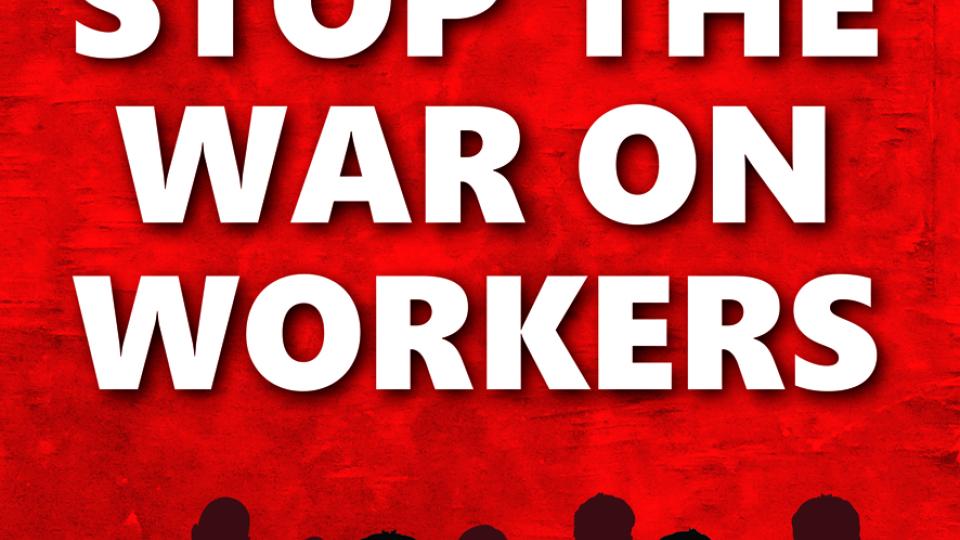Time to change broken industrial relations system

The time has come to scrap the misnamed Fair Work Act (FWA) and introduce genuine pro-worker and pro-union industrial relations legislation in this country.
Rising pressure on federal employment minister Michaelia Cash to resign over her cover-up of the illegal actions by former Australian Building and Construction Commission (ABCC) head Nigel Hadgkiss merely underlines the fact that Australia’s industrial relations system is badly broken.
A further sign of the need for change was figures revealing that workers have faced an effective wage freeze over the past decade.
The Sydney Morning Herald reported on September 20: “Australian household incomes have grown by less than the price of a coffee [ie, $3] a year since 2008 and the Reserve Bank has warned workers to expect low wage growth ‘for some time’ yet.”
This wage clamp-down is a direct result of the anti-worker industrial relations system, in particular the FWA, which has been used by governments and employers to shackle, and even attempt to crush, union organisation in this country.
Damning picture
A new parliamentary report released on September 7, Corporate Avoidance of the Fair Work Act, paints a damning picture of the federal government, which has:
- Slashed penalty rates for some of Australia’s lowest-paid workers;
- Created a disastrous internship scheme for young people that pays $4 an hour;
- Publicly argued against a new leave entitlement for people experiencing family and domestic violence;
- Cheered on as employers tear up collective agreements and make jobs insecure to cut workers’ pay and conditions; and
- Brought on a raft of anti-union legislation in an attempt to open workers up to even more exploitation.
The report found that action is needed to fix collective bargaining, stop wage theft, regulate the use of labour hire, end sham contracting, stop the exploitation of temporary visa workers and ensure that workers have access to accurate pay records and a workable system that gives them recourse against employers who do the wrong thing.
ACTU secretary Sally McManus said of the report: “This is a savage indictment of the Malcolm Turnbull government and Minister Michaelia Cash, who has done nothing to address systemic avoidance of the law by corporations, and has instead spent her time trying to destroy the rights of Australian workers.”
“Minister Cash is overseeing a broken system that is hurting workers in this country. Time and time again she has put the interests of big corporations and the very rich ahead of the interests of working people; this report makes that abundantly clear.”
“This government is directly responsible for the fact that the rules are broken for working people, and workers in Australia deserve better. They need a government which will work to change the rules to restore fairness in the workplace and fight inequality.”
The ACTU and other unions are demanding the resignation of Cash over the ABCC scandal and other anti-union actions. This would be a good start; but workers need much more.
Change the rules
The current FWA and its recent extensions have a long and chequered history.
When former Coalition Prime Minister John Howard tried to extend the anti-worker provisions of the Workplace Relations Act 1996 with the introduction of WorkChoices, the Australian Council of Trade Unions launched a mass industrial and political campaign “Your Rights at Work”.
The campaign was eventually re-directed towards the election of a Labor government in 2007. But the Labor government failed to repeal all the anti-union legislation.
The ABCC was abolished by Labor PM Julia Gillard, but WorkChoices was replaced by a less potent version: the Fair Work Act 2009 (otherwise known as WorkChoices Lite).
Under this new law the Fair Work Building Commission was established, which has now been re-morphed into a revived ABCC.
The Fair Work (Registered Organisations) Act 2009 provides the skeleton on which the government proposes to extend state intervention into the affairs of unions.
Recent actions by the Fair Work Commission (FWC), which oversees industrial relations generally, have proven that the FWA needs to be done away with, and our industrial laws radically re-constructed.
These actions by the FWC include the abolition of Sunday penalty rates for vulnerable sections of the workforce and increasing intervention by the commission to cancel enterprise bargaining agreements, throwing workers back onto basic awards and drastically cutting wages and conditions.
By contrast, in its Charter of Workers’ Rights, the Socialist Alliance demands, among other measures:
- A workplace Bill of Rights that guarantees workers and unions the right to organise and protest. Full recognition of unions and union representatives.
- Repeal the FWA, abolish the ABCC and other anti-union bodies.
- Oppose secret ballots on industrial action.
- Oppose all attempts to outlaw or restrict pattern bargaining, protected industrial action, picketing and secondary boycotts.
- Ban lock-outs and the discriminatory sacking of union delegates.
- Remove the prohibition on striking workers receiving unemployment benefits.
- Oppose union liability to pay damages for industrial action.
- Oppose court and government restrictions on who can stand in union elections.
- Oppose government interference in the internal affairs of unions, including any restrictions on union rights to amalgamate by membership vote.
By campaigning for such reforms, the union movement can rebuild its strength and resist the anti-worker offensive of the federal government and the employer class.
[Jim McIlroy is a retired public sector unionist and a member of Socialist Alliance.]